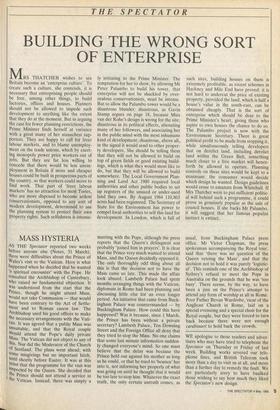THE SPECTATOR
BUILDING THE WRONG SORT OF ENTERPRISE
MRS THATCHER wishes to see Britain become an `enterprise culture'. To create such a culture, she contends, it is necessary that enterprising people should be free, among other things, to build factories, offiCes and houses. Planners should not be allowed to impede such development to anything like the extent that they do at the moment. But in arguing the case for fewer planning restrictions, the Prime Minister finds herself at variance With a great many of her staunchest sup- porters. They are happy to call for freer labour markets, and to blame unemploy- ment on the trade unions, which by exert- ing monopoly power price workers out of jobs. But they are far less willing to concede that there would be less unem- ployment in Britain if more and cheaper houses could be built in prosperous parts of the country, so that workers could move to find work. That part of `freer labour markets' has no attraction for most Tories, Who are more disposed to become ardent conservationists, opposed to any sort of modern development, determined to use the planning system to protect their own Property rights. Such selfishness is intense-
ly irritating to the Prime Minister. The temptation for her to show, by allowing Mr Peter Palumbo to build his tower, that enterprise will not be shackled by over- zealous conservationists, must be intense. But to allow the Palumbo tower would be a disastrous blunder: disastrous, as Gavin Stamp argues on page 18, because Mies van der Rohe's design is wrong for the site; disastrous in its political effects, alienating many of her followers, and associating her in the public mind with the most inhumane kind of development; disastrous, above all, in the signal it would send to other proper- ty developers. She should be telling them that they will not be allowed to build on top of green fields or good existing build- ings, which is what they would most like to do, but that they will be allowed to build somewhere. The Local Government Plan- ning and Land Act 1980 required local authorities and other public bodies to set up registers of the unused or under-used land they own. By August 1984 110,863 acres had been registered. The Secretary of State for the Environment has power to compel local authorities to sell this land for development. In London, which is full of such sites, building houses on them is extremely profitable, as recent schemes in Hackney and Mile End have proved: it is not hard to undercut the price of existing property, provided the land, which is half a house's value in the south-east, can be obtained cheaply. That is the sort of enterprise which should be dear to the Prime Minister's heart, giving those who aspire to own houses the chance to do so. The Palumbo project is now with the Environment Secretary. There is great political profit to be made from stopping it, while simultaneously telling developers that on derelict land, including derelict land within the Green Belt, something much closer to a free market will hence- forth be allowed to operate. Planning controls on these sites would be kept to a minimum: the consumer would decide which design he wanted. Design guidelines would cease to emanate from Whitehall. If Mrs Thatcher were to put sufficient politic- al will behind such a programme, it could prove as genuinely popular as the sale of council houses. If she backs Mr Palumbo, it will suggest that her famous populist instinct is extinct.


















































 Previous page
Previous page